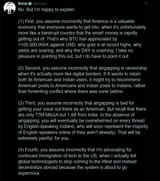Search Results
7/9/2025, 1:21:21 AM
https://x.com/balajis/status/1942668191186247784#m
(5) Fifth, you assume incorrectly that every Indian is dependent on the H-1B. But the H-1B is about as central to Indian talent today as the American market is to Chinese trade. That is: it's not so important that it can't be done without.
As context, after the start of the trade war in 2017, China rerouted most of its trade over the last 10 years to other markets, such that it only gets ~15% of revenue from the US. Like it or not, that means China is essentially indifferent to the 2025 tariffs.
Indians are similarly already rerouting talent flows to places like Dubai in the UAE, which has a higher GDP-per-capita and millionaire density than the US...and is rolling out golden visas even as the US is cutting back on H-1Bs. South Asians are >50% of the UAE, so Dubai is friendly to Indians in a way the US increasingly isn't.
That is happening simultaneously with the growth of the Indian home market. You might not know this, but India was the fastest growing economy in the world over the last 10 years, even ahead of China:
Finally, and most importantly, because Indians now have the TCP/IP visa, they don't really need the H-1B visa. An Indian engineer may be a second class citizen in America, but they are a first class citizen on the global Internet, and that's all they need.
Anyway: in the long run, I do think Americans and Indians will get along again. But for the foreseeable future I advise Indians to (a) not come to America, (b) not inadvertently boost anti-Indian threads, (c) build themselves up economically in India, in the UAE, and on the Internet, and (d) generally reduce their dependence on the US in every possible respect, especially with respect to the US financial system.
That's what airgapping means.
(5) Fifth, you assume incorrectly that every Indian is dependent on the H-1B. But the H-1B is about as central to Indian talent today as the American market is to Chinese trade. That is: it's not so important that it can't be done without.
As context, after the start of the trade war in 2017, China rerouted most of its trade over the last 10 years to other markets, such that it only gets ~15% of revenue from the US. Like it or not, that means China is essentially indifferent to the 2025 tariffs.
Indians are similarly already rerouting talent flows to places like Dubai in the UAE, which has a higher GDP-per-capita and millionaire density than the US...and is rolling out golden visas even as the US is cutting back on H-1Bs. South Asians are >50% of the UAE, so Dubai is friendly to Indians in a way the US increasingly isn't.
That is happening simultaneously with the growth of the Indian home market. You might not know this, but India was the fastest growing economy in the world over the last 10 years, even ahead of China:
Finally, and most importantly, because Indians now have the TCP/IP visa, they don't really need the H-1B visa. An Indian engineer may be a second class citizen in America, but they are a first class citizen on the global Internet, and that's all they need.
Anyway: in the long run, I do think Americans and Indians will get along again. But for the foreseeable future I advise Indians to (a) not come to America, (b) not inadvertently boost anti-Indian threads, (c) build themselves up economically in India, in the UAE, and on the Internet, and (d) generally reduce their dependence on the US in every possible respect, especially with respect to the US financial system.
That's what airgapping means.
Page 1
